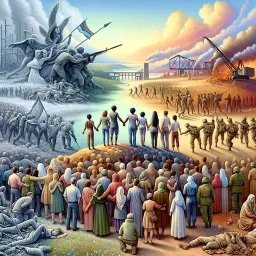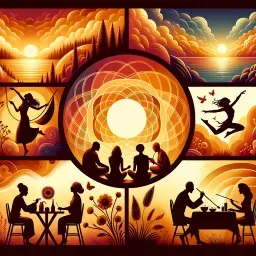”The bad news is time flies.
The good news is you're the pilot“

- Meaning
- The quote encapsulates a duality of existential contemplation: the inevitability of the passage of time often feels daunting and can evoke a sense of loss or urgency (the bad news), while simultaneously presenting an opportunity for empowerment and control over one's life choices (the good news). It draws on philosophical themes of free will and the transient nature of human existence, suggesting that while we cannot stop time, we can navigate it intentionally.
- Allegory
- In the allegorical image, the pilot, representing the individual, embodies the central theme of agency over the passage of time. The clouds symbolize the transient nature of moments, while the various symbols in the cockpit highlight the choices and opportunities available. The floating timepieces serve as reminders of time's relentless advance, illustrating that while time may fly, one's choices and decisions define the direction taken through life.
- Applicability
- In personal life, this phrase can be applied as a reminder to seize control of our choices and decisions, encouraging individuals to focus on what truly matters and to make the most of their time. It suggests that, although time may seem to slip away, how we choose to use that time is entirely in our hands.
- Impact
- The phrase has had a considerable impact on motivational speaking and self-help literature by inspiring individuals to take charge of their lives, emphasizing personal responsibility and proactive engagement with time. It is often quoted in workshops, seminars, and personal development articles.
- Historical Context
- This quote likely emerged in contemporary motivational literature of the late 20th or early 21st century, reflecting the growing emphasis on personal empowerment and self-improvement audiences often encounter today. It invokes the cultural shift towards valuing mindfulness and proactive life management.
- Criticisms
- While the phrase is generally viewed positively, critics may argue that it oversimplifies the complexity of life’s challenges, implying that awareness of time alone is sufficient for effective life management. Some may contend that not everyone has equal resources or circumstances to effectively pilot their own lives, thus making the metaphor potentially misleading.
- Variations
- Variations on this phrase exist in various cultures, emphasizing the relationship between time and personal agency. For example, in Chinese proverbs, notions of time and opportunity often encourage stewardship over one's life path. Interpretations may vary by cultural context, but common themes of control and response to time persist across cultures.
-

The two most powerful warriors are patience and time.
-

I've seen things you people wouldn't believe, attack ships on fire off the shoulder of Orion, I watched c-beams glitter in the dark near the Tannhäuser Gate. All those moments will be lost in time, like tears in rain. Time to die.
-

Don't dream it. Be it.
-

After me, the flood.
-

We have met the enemy and they are ours.
-

I am the way, the truth, and the life; no one comes to the Father except through me.
-

I am one with the Force, and the Force is with me.
-

Real knowledge is to know the extent of one's ignorance.
-

It's not the years in your life that count, it's the life in your years.
-

We do not inherit the Earth from our ancestors; we borrow it from our children.
-

You control your destiny — you don’t need magic to do it.
No Comments